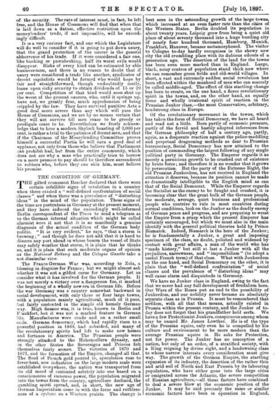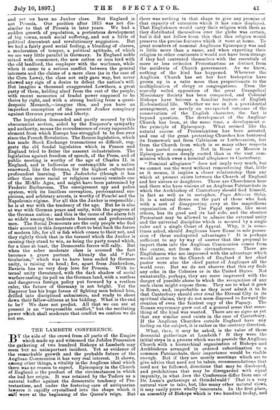THE CONDITION OF GERMANY. T HE gifted economist Reacher declared that
there were certain infallible signs of revolution in a country- when there existed a "well-defined confrontation of social classes" and when there was a prevalence of "disturbing ideas" in the mind of the population. These signs of the time are portentous in Germany at the present moment, and they have induced the exceedingly well-informed Berlin correspondent of the Times to send a telegram as to the German internal situation which might be called alarmist were it not that it is so manifestly a, genuine diagnosis of the actual condition of the German body politic. "It is very evident," he says, "that a storm is brewing ; " and though he does not add that it is hard to discern any port ahead in whose bosom the vessel of State may safely weather that storm, it is plain that he thinks so, and it is plain that such moderate organs of opinion as the National Zeitung and the Cologne Gazette take a not dissimilar view.
The Franco-German War was, according to Zola, a blessing in disguise for France ; but we might almost ask whether it was not a gilded curse for Germany. Let us consider what it has involved for the German people. It was not merely a victory over a dangerous foe, it marked the beginning of a wholly new era in German life. Before the war Germany was a country somewhat backward in social development, with only three or four large towns, with a population mainly agricultural, much of it poor, but fairly contented in the simple old homely German way. High finance was, it is true, known in Berlin and F.-ankfort, but it was not a marked feature in German life. Manufactures were crude and on a rather small scale. German democracy, which had rapidly risen to a powerful position in 1848, had subsided, and many of the revolutionary spirits had left to make new homes and fortunes in America. The Prussian people were strongly attached to the Hohenzollern dynasty, and in the other States the Sovereigns and Princes felt themselves fairly secure. The victories of 1870 and 1871, and the formation of the Empire, changed all that. The flood of French gold poured in, speculation rose to fever-heat, new industries on the large modern scale were established everywhere, the nation was transported from its old mood of contented sobriety into one based on a consciousness of immense power, the population migrated into the towns from the country, agriculture declined, the gambling spirit spread, and, in short, the new age of .German Imperialism came in with the force and ruthless- aess of a cyclone on a Western prairie. The change is best seen in the astounding growth of the large towns. which increased at an even faster rate than the cities of the Western States. Berlin doubled its population in about twenty years, Leipzig grew from being a quiet old place of about seventy thousand into a huge bustling city of nearly four hundred thousand, Hamburg, Munich, Frankfort, Hanover, became metamorphosed. The visitor to Cologne to-day hardly recognises in the showy new city the old crumbling place with its dubious odours of a generation ago. The desertion of the land for the towns has been even more marked than in England. Large. black, noisy centres of population stand thick now where we can remember green fields and old-world villages. In short, a vast and extremely sudden social revolution has been effected within the manhood of men who can scarcely be called middle-aged. The effect of this startling change has been to create, on the one hand, a fierce revolutionary spirit in the towns, and, on the other hand, an equally fierce and wholly irrational spirit of reaction in the Prussian Junker class,—the most Conservative, arbitrary, headstrong class in Europe.
Of the revolutionary movement in the towns, which has taken the form of Social Democracy, we have all heard and read not a little. Born partly of economic pressure, partly of the fervid and hastily adopted inferences from the German philosophy of half a century ago, partly, again, as a desperate reaction against the police-meddling and perpetual dragooning methods so dear to Prussian bureaucracy, Social Democracy has now attained to the position of commanding the largest following of any single political party in Germany. The Emperor regards it as merely a pernicious growth to be crushed out of existence by brute force ; and therefore it is no wonder that it grows by persecution. But the party of the Extreme Right, the old Prussian Junkerdom, has not received in England the attention it deserves, because its position cannot be made so dramatically intelligible to the English mind as can that of the Social Democrat. While the Emperor regards the Socialist as the enemy to be fought and crushed, it is becoming clear that the great bulk of the German people, the moderate, average, quiet business and professional people who contrive to rule in most countries during normal conditions, look on the Junker as the deadly enemy of German peace and progress, and are preparing to wrest the Empire from a grasp which the present Emperor has certainly encouraged, but which we must also in the main identify with the general political theories held by Prince Bismarck. Indeed, Bismarck is the hero of the Junker; he is fundamentally a Junker, a great and imposing specimen of the class, no doubt, polished and widened by contact with great affairs, a man of the world who has "made history," but still at last a Junker with all the prejudices, narrowness, and. " impossibilism " (to adopt a useful French term) of that class. What with Junkerdom on the one hand, and Social Democracy on the other, it is plain that the "well-defined confrontation" of social classes and the prevalence of "disturbing ideas" may well cause alarm and disquietude in Germany.
We have no Junker class in England, owing to the fact that we never had any full development of feudalism here. Our Wars of the Roses put an end to the possibility of Junkerdom, and our nobility never became an absolutely separate class as in Prussia. It must be remembered that serfdom, with all that that means, actually existed in Prussia within the present century, and the Junker of to- day does not forget that his grandfather held serfs. We have a few Protectionist Junkers, conspicuous among whom may be named Mr. James Lowther. He is of the type of the Prussian squire, only even he is compelled by his culture and environment to be more modern than the average Prussian squire is. He asks for Protection, not for power. The Junker has no conception of a nation, but only of an order, of a stratified society, with a King reigning by divine right, and a landowning class to whose narrow interests every consideration must give way. The growth of the German Empire, the startling expansion of its industry, the desertion of the rather thin and arid soil of North and East Prussia by its labouring population, who have either gone into the large cities or emigrated across the Atlantic, the severe competition of Russian agriculture,—all these factors have combined to deal a severe blow at the economic position of the Junker. It may be said precisely the same or similar economic factors have been in operation in England, and yet we have no Junker class. But England is not Prussia. Our position after 1815 was not dis- similar to that of Prussia in later years. We had a sudden growth of population, a portentous development of big towns, much social suffering, and not a little of political discontent and revolutionary suggestion. But we had a fairly good social feeling, a blending of classes, a moderation of temper, a. political aptitude, of which we see very little parallel in Germany. In England noble mixed with commoner, the new cotton or iron lord with the old landlord, the employer with the workman, while when it came to a serious conflict between the general interests and the claims of a mere class (as in the case of the Corn Laws), the class not only gave way, but never showed any sign of a desire to defeat the nation's will. But imagine a thousand exaggerated Lowthers, a great party of them, holding aloof from the rest of the people, with recent memories of feudal power supposed to be theirs by right, and with a strong backing from a quasi- despotic Monarch,—imagine this, and you have an imperfect conception of the present Junker conspiracy against German progress and liberty.
The legislation demanded and partly secured by this obscurantist section, aided by the Emperor's sympathy and authority, means the recrudescence of every impossible element from which Europe has struggled to be free ever since the French Revolution. The Bourse legislation, which has made Stock Exchange transactions so difficult, sug- gests the old feudal legislation which in France and England tried to fetter the nascent industrialism. The legislation against freedom of speech, of the Press, and of public meeting is worthy of the age of Charles II. in England, and is ludicrous or contemptible in a nation renowned, like the German, for the highest culture and profoundest learning. The .hulenhetze (though it has other than mere racial or religious causes) reminds one of the Miadle Ages, and might have been patronised by Frederic Barbarossa. The omnipresent spy and police system, with its limitless corruption, preternatural sus- picions, and arbitrary arrests, is worthy of Fouche and the Napoleonic regime. For all this the Junker is responsible ; he is at war with the tendency of the age. But he is also at war with German peace and unity, with the progress of the German nation ; and this is the cause of the alarm felt so widely among the moderate business and professional men. The Social Democrats are the only people who find their account in this desperate effort to beat back the forces of modern life, for all is fish which comes to their net, and they rightly think that in the turmoil which the Junker is causing they stand to win, as being the party round which, for a time at least, the Democratic forces will rally. But when the sober moderate class is aroused the fact becomes a grave portent. Already the old "Par- ticularism," which was to have been ended by German unity, is raising its head ; for, apart from Junkerdom, Bavaria has no very deep love for Prussia. With in- ternal unity threatened, with the dark shadow of social warfare casting its pall on the German land, with a restless and dangerous foreign policy put forward by a restless ruler, the future of Germany is not bright. Yet the Emperor has his huge forces of fighting men behind him, drilled into disciplined submission, and ready to shoot down their fellow-citizens at his bidding. What is the end to be ? We dare not predict. All that we can see at present is an "irrepressible conflict," but the mediating power which shall moderate that conflict we confess we do not see.



































 Previous page
Previous page